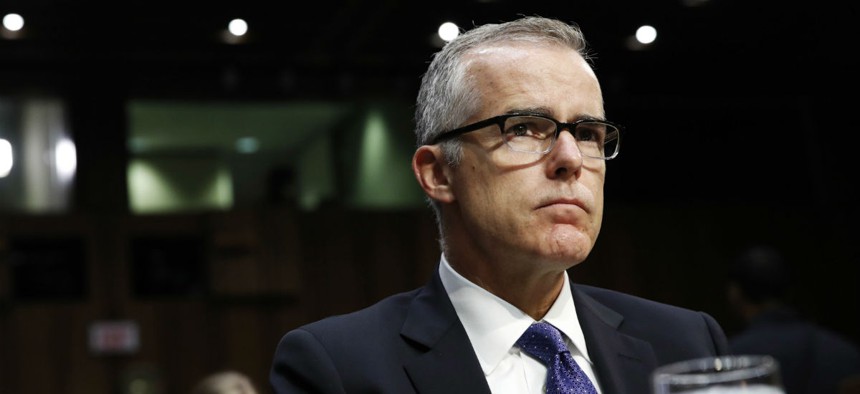McCabe Lawsuit Over Dismissal Could Question Watchdog’s Independence
Former FBI deputy director says IG "delivered" result Trump called for.
Andrew McCabe, the fired FBI deputy director who has been promoting his new book, on Sunday hinted at a possible attack on the independence of the Justice Department’s inspector general.
In an interview on ABC’s “This Week,” McCabe gave a brief preview of the civil lawsuit his attorney is preparing contesting his March 2018 dismissal just 26 hours before his scheduled retirement.
After aiming back at President Trump for his multiple tweets calling McCabe a disgrace, the 21-year FBI veteran on Sunday said he disagreed with a report released last year by Inspector General Michael Horowitz.
The watchdog, as part of a larger inquiry into the FBI’s 2016 election probes, concluded in a special report that McCabe had “lacked candor” in responses to investigator queries about whether he had leaked to a reporter sensitive information on the bureau’s 2016 investigation of former Secretary of State Hillary Clinton’s use of a private email server.
On Sunday, McCabe repeated assertions outlined in his book that any misstatements to investigators were not deliberate. But now, facing possible charges, he stressed that he said he "deeply" disagrees with the inspector general's findings and linked them to his untimely dismissal and Trump’s attacks.
After Trump “made his desires perfectly clear on his own Twitter feed, the inspector general delivered that result," McCabe told chief anchor George Stephanopoulos.
Horowitz’s staff declined to comment to Government Executive, and McCabe’s attorney—former Justice Department IG Michael Bromwich—did not respond to requests for elaboration.
Though Trump has frequently criticized inspectors general, their statutory charter allows them independence both from agency heads and Congress.
Horowitz, in his February 2018 report specific to McCabe’s conduct, reported that in late October 2016, McCabe authorized special counsel and public affairs officials to discuss with a Wall Street Journal reporter “issues related to the FBI’s Clinton Foundation investigation.” The IG found that “in a conversation with then-Director [James] Comey shortly after the WSJ article was published, McCabe lacked candor when he told Comey, or made statements that led Comey to believe, that McCabe had not authorized the disclosure and did not know who did,” the report said. “This conduct violated FBI Offense Code 2.5 (Lack of Candor – No Oath).”
Horowitz’s team “also found that on May 9, 2017, when questioned under oath by FBI agents from [the inspection division], McCabe lacked candor when he told the agents that he had not authorized the disclosure to the WSJ and did not know who did. This conduct violated FBI Offense Code 2.6 (Lack of Candor—Under Oath).” The report cited two other such incidents.
In his new book The Threat, McCabe wrote, “This report was used as a pretext for dismissal. The attorney general ordered my firing on March 16—twenty-six hours before my planned retirement.”
McCabe recalled being told by Horowitz’s staff in December 2017 after he testified to the House Intelligence Committee on Trump’s controversial firing of Comey that “the report on me would be coming out first—and earlier than expected”—before Horowitz released his larger report on the 2016 issues.
McCabe described his post-facto efforts to amend his earlier testimony that the IG had faulted. “Having corrected the record without delay, I trusted that the process would confirm that I had done my best to answer the questions accurately—and when I realized I needed to clarify and correct what I had said, I did so voluntarily, without being prompted,” he wrote.
But “through the fall, the president’s anger seemed difficult to contain.” And in January 2018, Director Chris Wray—after conferring with the IG—“called me in to a one-on-one meeting on a Sunday night and demanded that I leave the position of deputy director.”
On Monday, Matt Miller, former chief spokesman for the Justice Department, addressed Government Executive’s questions about the independence of IGs and any possible pressure from Trump. “I don’t think the IG’s finding was biased—I don’t think Horowitz cares one way or another what the president thinks,” Miller said. “But I do think the decision to cleave the McCabe portion of the investigation off from the overall investigation and finish it ahead of time was influenced by the direction of senior DoJ officials.”
Miller, now a partner at the Vianovo strategy firm, said the full story is probably not out as to “why the McCabe part was rushed out before the rest of the report was finished. If it weren’t for all the politics surrounding McCabe, he would have been allowed to retire with full benefits—which is the way the Justice Department usually handles it.”




